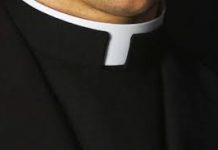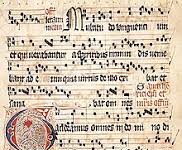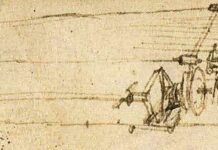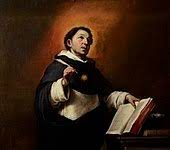One of the age-old objections that Protestants have to the Catholic priesthood is known as the “Call No Man Father” Argument, which runs something like this: Christ in Matthew 23:9 forbids His disciples from calling men their fathers,[1] and since one is to take the words of Christ according to the Literal Sense of Scripture, this means that Catholics are wrong to call their priests “Father.”[2] On the face, it seems like a very compelling argument, and especially with the attack on the Literal Sense of Scripture that the Church has experienced in the past hundred years, Catholics might wonder how to answer such an argument. The flaw of this “Call No Man Father” Argument is easily exposed when one uses a Reductio ad Absurdum Argument, using Saint Joseph in his minor premise.
If Christ literally meant that His disciples and all Christians should not call any man “father,” then Christ Himself, being God and the perfect man and the most intelligent human being to ever exist, would need to be consistent in His basis of division and apply His rule to Himself and His earthly father, Saint Joseph. If a Catholic is to take Christ’s command literally here, then Christ would not be able to call Saint Joseph His “father,” and Mary, the most perfect and holiest woman to ever live, would also be disobeying the command of her Son when she and Joseph found Him in the Temple and while speaking to Christ referred to Saint Joseph as “your father” after expressing the anxiety that she and Joseph experienced searching for their lost Son.[3] Further, Christ would not be fulfilling the Fourth Commandment if He did not show His father Saint Joseph the proper respect and love by addressing him as “father,” which is also clearly absurd because Christ was both God and the perfect man; He was perfect in virtue and always fulfilled the law perfectly, and thus it was incumbent on Christ in His humanity to render this due honor to Saint Joseph by calling him “father.” Clearly, we must reject such a proposition that Christ meant this command “call no man your father” literally, otherwise further contradictions would be found in the sayings of Christ; He would contradict Himself by repeating the Fourth Commandment in Matthew 19:19, and by referring to Abraham as “Father Abraham” in Luke 16:24.[4]
Thus, if Christ did not mean this command literally, then what is He trying to tell us when He says “call no man your father”? What Christ is trying to tell us is that all fatherhood comes from God the Father.[5] For Catholics and Protestants alike call their earthly fathers “father,” and throughout the Bible various men are called “father.”[6] In Acts 7:2 and 22:1, St. Stephen and St. Paul himself call the Jewish authorities “fathers,” and Saint Paul even recognizes himself as having the power and authority of a father in his letters, particularly in 1 Corinthians 4:14-15, 1 Thessalonians 2:11, 1 Timothy 1:2, and Titus 1:4.[7] This is because Saint Paul — like all priests, bishops, and popes — participates in the Fatherhood of God the Father by being the principle of spiritual life for the family of God, just as earthly fathers participate in the Fatherhood of God the Father by being the principle of earthly life for their families.[8] As I have noted in my previous articles,[9] we see this participation of all fatherhood in the Fatherhood of God the Father in Ephesians 3:14-15, where Saint Paul writes that “[f]or this cause I bow my knees to the Father of our Lord Jesus Christ, of whom all paternity in heaven and earth is named.”[10] For through their embodiment of the essence or form of paternity natural or earthly fathers participate in the paternity “on earth” which Saint Paul references in Ephesians 3:14-15, while priests, bishops, and popes through their embodiment of the essence or form of paternity participate in the paternity “in heaven” that Saint Paul refers to in Ephesians 3:14-15; and thus, since all fathers — be they spiritual or natural fathers — participate in an aspect or a part of the Paternity of God the Father, this means that God the Father has the fullness of Paternity in Himself, and thus possesses all of the perfections of fatherhood combined, having all of the perfections of fatherhood that other fathers have but in a surpassing way, since God the Father is the proper principle or proper cause of life, while all other natural fathers, priests, bishops, and popes are the instrumental causes of life in their respective families. Thus, it is clear that Christ is telling us in Matthew 23:9 that all fatherhood comes from God the Father because all fathers participate in the Fatherhood of God the Father as is clear from Ephesians 3:14-15.
In fact, priests, bishops, and popes are fathers in a more real sense than earthly fathers are because they embody the higher perfections of God’s Fatherhood. For since according to Aristotle and Saint Thomas Aquinas it is the essence of paternity to be the principle of life for one’s child,[11] and since according to the Angelic Doctor it is true that “the good of grace in one is greater than the good of nature in the whole universe,”[12] its stands to reason that being the principle or cause of the good of grace, namely, being the principle or cause of the life of grace, is greater than being the principle or cause of the good of nature, namely, being the principle or cause of natural life; further, since all priests, bishops, and popes are the principles of spiritual life or of the life of grace for their children — a priest for the members of his parish, a bishop for the members of his diocese, and the Pope for the members of the entire Catholic Church — this means that it is through the priesthood that all men participate in a greater way in the Fatherhood of God the Father more than natural or earthly fathers do, which is what Saint Paul seems to be indicating in Ephesians 3:14-15 when he speaks of the fatherhood “in heaven.” For because Heaven is higher than the earth, it therefore seems that Saint Paul through the mode of the height or altitude that Heaven has over and above the earth is telling his readers that the paternity “in heaven” — namely, the paternity of priests, bishops, and popes — is higher or greater in reality or in its participation in the Paternity of God the Father than the paternity “on earth” — namely, the paternity of natural or earthly fathers — and hence it follows that if both Catholics and Protestants should call their natural or earthly fathers “father,” then a fortiori it is necessary that Catholics call their priests, bishops, and popes “father” due to the fact that the Catholic priesthood makes priests, bishops, and popes participate in God’s Fatherhood in a more real way than they could if they were natural or earthly fathers. Further, since the bishop and the pope have the fullness of the priesthood,[13] it follows that the episcopacy and the papacy enable men to participate in the Fatherhood of God the Father in a greater way than even priests participate in God’s Paternity, such that any bishop or pope is “a living image of God the Father,” as Saint Ignatius of Antioch said so beautifully.[14]
Furthermore, even in respect to this Saint Joseph surpasses the dignity of all other fathers, such that through his form or essence Joseph participates in the Fatherhood of God the Father to a supereminent or pre-eminent degree, and deserves the title of “father” more than any other created manifestation of fatherhood, be they natural or earthly fathers, priests, bishops, or popes. For Joseph was the principle or cause not only of the natural life or of the good of nature for his Son, Jesus Christ, by providing the marriage within which Jesus could be virginally conceived[15] — as natural fathers are the cause or principle of natural life or of the good of nature for their children — but Joseph was also the principle or cause of the spiritual life of grace or of the good of grace for his spiritual children in all Catholic families — just as a natural or earthly Catholic father is for his family[16] — and for his spiritual children in all parishes — just as a priest is for his parish — and for his spiritual children in all dioceses — just as a bishop is for his diocese — and for his spiritual children in the entire Catholic Church — just as the Pope is for the entire Catholic Church — for the precise reason that Saint Joseph was the first principle or cause of the life of grace or of the good of grace in the humanity of the Head of the Mystical Body of Christ, namely, in the humanity of his Son, Jesus Christ. For it was in the house and under the headship of Joseph that Jesus “advanced in wisdom, and age, and grace with God and men,”[17] and this means that Jesus in His humanity did grow in grace, and this because — as the biblical passage says — Jesus was subject to Joseph. For all grace comes into the family through the father,[19] and since the Holy Family is the greatest of all families, and since Christ was fully human, and since according to that famous Scholastic maxim that “grace does not destroy nature but perfects it,”[20] because in families grace naturally and principally comes into the family to the children through the father of the family, it follows that neither the Holy Family nor Christ in His humanity were exempt from this law of nature, and as such grace must have flowed into the Holy Family to the humanity of Christ through Joseph first, making Saint Joseph the principle or cause of the good of grace for the entire Catholic Church[21] by being the principle or cause of both the life grace and of the natural life for the Son of God in His humanity.
Thus, it stands to reason that Joseph participates most in the Fatherhood of God the Father because Joseph has within himself all of the perfections of fatherhood as God the Father has within Himself all the perfections of Fatherhood, for the reason that Joseph is the first principle or cause for Christ and for the entire Catholic Church as God the Father is the principle of God the Son[22] and of the entire Catholic Church. Hence, it stands to reason that if a bishop or a pope is called the “image of God the Father” for possessing merely one perfection of God’s Fatherhood and for this reason merits the title of “father,” it stands to reason that Joseph a fortiori is the ultimate living Image of God the Father for the reason that Joseph participates in all of the perfections of fatherhood, and thus Joseph most of all merits the title of “father” more than any other father — be they natural or earthly father, priest, bishop, or pope.
Therefore, as I noted in one of my previous articles,[23] since according to Thomas “the nature of an image requires likeness in species,”[24] and since the Latin word “species” is the same word that refers to the essence, form, or nature of something,[25] and since fatherhood is a form or essence,[26] and since Ephesians 3:14-15 is a participation argument stating that all created manifestations of the form or essence of paternity all participate in the Paternity of God the Father with Saint Joseph receiving the highest participation in God’s Paternity, this means that Joseph most merits the title of “father” more than any other created manifestation of fatherhood due to the fact that Joseph is the Image of God the Father, and Joseph is the Image of God the Father because as to his essence or as to his created embodiment of the form or essence of paternity Joseph has the highest participation in the Paternity of God the Father because he possesses all of the perfections of paternity in his very essence or form of fatherhood. In other words, Joseph as the Image of God the Father is the most perfect image or reflection of the Paternity of God the Father because Joseph reflects in his form or essence all of the perfections of fatherhood that God the Father has because Joseph in his form or essence possesses all of the perfections of fatherhood as an instrumental cause as God the Father has all of the perfections of fatherhood as a proper cause, so that Joseph perfectly reflects God the Father’s Paternity, making Joseph’s form or essence of fatherhood the most real, the most in act as Saint Thomas Aquinas would put it, and giving Joseph a “certain infinite dignity”[27] through this great privilege of being the Image of God the Father.[28] Therefore, on account of all this Joseph above all created fathers is the most actual or the most real of fathers, which means that Joseph is the worthiest of the title of “father.”
In closing this apologetic article on this age-old Protestant objection, this is I say to all Protestants, in all charity and kindness; if you are truly Christians, then you too must call priests your “fathers,” as Christ called Saint Joseph His “father”; further, you too must also call Saint Joseph your father, as Christ also called Joseph His “father.” For I can make you certain of this, that even before you are willing or able to accept Joseph as your Father, and even before priests, bishops, and popes are willing or able to accept you as their children, Father Joseph would be more than happy to call you his beloved children — for all eternity.
[1] Matthew 23:9.
[2] Father Frank Chacon and Jim Burnham, Beginning Apologetics I: How to Explain and Defend the Catholic Faith (Farmington: San Juan Catholic Seminars, 2000-2010), 41.
[3] Luke 2:48.
[4] Chacon and Burnham, Beginning Apologetics I, loc. cit., emphasis added.
[5] Ibid.
[6] Ibid.
[7] Ibid.
[8] Ibid.
[9] Joshua Francis Filipetto, “Joseph, Our Spiritual Father,” Catholic Insight, November 8, 2021, https://catholicinsight.com/joseph-our-spiritual-father/; Joshua Francis Filipetto, “Joseph, the Image of God the Father,” Catholic Insight, November 22, 2021, https://catholicinsight.com/author/joshua-francis-filipetto/.
[10] Epistula Ad Ephesios 3:14-15, emphasis added: “Huius rei gratia flecto genua mea ad Patrem Domini nostri Iesu Christi ex quo omnis paternitas in caelis et in terra nominatur.”
[11] Aristotle, Physics II.3, 194b25-35: “ἔτι ὅθεν ἡ ἀρχὴ τῆς μεταβολῆς ἡ πρώτη ἢ τῆς ἠρεμήσεως, οἷον…ὁ πατὴρ τοῦ τέκνου.” See also Aristotle, Metaphysics, V.2, 1013a25-35: “ἔτι ὅθεν ἡ [30] ἀρχὴ τῆς μεταβολῆς ἡ πρώτη ἢ τῆς ἠρεμήσεως, οἷον… ὁ πατὴρ τοῦ τέκνου.” See also Saint Thomas Aquinas, Summa Theologiae, trans. Fr. Laurence Shapcote, O.P., ed. John Mortensen and Enrique Alarcon (Lander: The Aquinas Institute for the Study of Sacred Doctrine, 2012), II-II, q. 102, a. 1, co., https://aquinas.cc/la/en/~ST.I: “Sicut autem carnalis pater particulariter participat rationem principii, quae universaliter invenitur in Deo; ita etiam persona quae quantum ad aliquid providentiam circa nos gerit, particulariter participat proprietatem patris, quia pater est principium et generationis et educationis et disciplinae, et omnium quae ad perfectionem humanae vitae pertinent.” See also Ibid., I, q. 33, a. 1, co: “Respondeo dicendum quod hoc nomen principium nihil aliud significat quam id a quo aliquid procedit, omne enim a quo aliquid procedit quocumque modo, dicimus esse principium; et e converso. Cum ergo pater sit a quo procedit alius, sequitur quod pater est principium.”
[12] Ibid., I-II, q. 113, a. 9, ad 2: “Sed bonum gratiae unius maius est quam bonum naturae totius universi.”
[13] Pope Saint John Paul II, Catechismus Catholicae Ecclesiae (Rome: Libreria Editrice Vaticana, 1997), 1557, https://www.vatican.va/archive/catechism_lt/index_lt.htm: “Concilium Vaticanum II docet « episcopali consecratione plenitudinem conferri sacramenti Ordinis, quae nimirum et liturgica Ecclesiae consuetudine et voce sanctorum Patrum summum sacerdotium, sacri ministerii summa nuncupatur ».” For the English translation, see Pope Saint John Paul II, Catechism of the Catholic Church (Rome: Libreria Editrice Vaticana, 1997), 1557, https://www.vatican.va/archive/ENG0015/__P4U.HTM : “The Second Vatican Council ‘teaches . . . that the fullness of the sacrament of Holy Orders is conferred by episcopal consecration, that fullness namely which, both in the liturgical tradition of the Church and the language of the Fathers of the Church, is called the high priesthood, the acme (summa) of the sacred ministry.’”
[14] Pope Saint John Paul II, Catechismus Catholicae Ecclesiae, 1549, emphasis added: “Secundum pulchram sancti Ignatii Antiocheni locutionem, Episcopus est typos tou Patrós, quasi vivens imago Dei Patris.” For the English translation, see Pope Saint John Paul II, Catechism of the Catholic Church, 1549: “In the beautiful expression of St. Ignatius of Antioch, the bishop is typos tou Patros: he is like the living image of God the Father.” Sanctus Ignatius Antiochenus, Epistula ad Trallianos, 3, 1, quoted in Pope Saint John Paul II, Catechismus Catholicae Ecclesiae, 1554, emphasis added: “Cuncti revereantur diaconos ut Iesum Christum, sicut et Episcopum, qui est typus Patris, presbyteros autem ut senatum Dei et concilium Apostolorum. Sine his Ecclesia non vocatur.” For the English translation of Saint Ignatius of Antioch’s words, see Saint Ignatius of Antioch, Letter to the Trallians, 3, 1, in Pope Saint John Paul II, Catechism of the Catholic Church, 1554, emphasis added: “Let everyone revere the deacons as Jesus Christ, the bishop as the image of the Father, and the presbyters as the senate of God and the assembly of the apostles. For without them one cannot speak of the Church.”
[15] For a more in-depth explanation for how Joseph was virginally the principle or cause of the natural life of Christ, see Joshua Francis Filipetto, “Joseph, the Image of God the Father,” Catholic Insight, November 22, 2021, https://catholicinsight.com/author/joshua-francis-filipetto/.
[16] “For Husbands & Fathers – Fr Ripperger (series on marriage 3 of 5),” Sensus Fidelium, January 12, 2020, https://www.youtube.com/watch?v=WMNil87BnKo, 3:30-8:33.
[17] Luke 2:52 (Douay-Rheims), emphasis is mine.
19] “For Husbands & Fathers – Fr Ripperger (series on marriage 3 of 5),” Sensus Fidelium, January 12, 2020, https://www.youtube.com/watch?v=WMNil87BnKo, 3:30-8:33.
[20] Aquinas, Summa Theologiae, I, q. 1, a. 8, ad 2: “Cum enim gratia non tollat naturam, sed perficiat [eam].”
[21] St. Pope Paul VI, “Discourse to the Equipes Notre Dame Movement (May 4, 1970),” as quoted in St. John Paul II, Apostolic Exhortation Redemptoris Custos (On the Person and Mission of St. Joseph in the Life of Christ and of the Church), 7, https://www.vatican.va/content/john-paul-ii/en/apost_exhortations/documents/hf_jp-ii_exh_15081989_redemptoris-custos.html: “Ecce quippe Novo ineunte Testamento, haud secus atque Veteris Testamenti principio, adest coniugum par. Verum, licet Adami Evaeque fuerit par malorum fons quae orbem obruerunt, culmen efficiunt Josephus ac Maria unde diffunditur universa in terras sanctimonia. Opus namque salutis Servator ex virginali hac et sacra coniunctione incohavit, ubi omnipotens ipsius ostenditur voluntas purificandae ac sanctifcandae familiae, quae et amoris sacrarium est et vitae ipsius seminarium.” See also St. Pope Paul VI, “Discourse to the Equipes Notre Dame Movement (May 4, 1970),” 7, https://www.vatican.va/content/paul-vi/fr/speeches/1970/documents/hf_p-vi_spe_19700504_notre-dame.html: “[H]ere at the threshold of the New Testament as at the entrance of the Old stands a couple. But, while that of Adam and Eve was the source of the evil that swept over the world, that of Joseph and Mary is the summit from which holiness spreads over the whole earth. The Savior began the work of salvation with this virginal and holy union in which his almighty will to purify and sanctify the family is manifested, this sanctuary of love and this cradle of life.”
[22] Aquinas, Summa Theologiae, I, q. 33, a. 1, co; Dr. Ludwig Ott, Fundamentals of Catholic Dogma, ed. James Canon Bastible, D.D., trans. Patrick Lynch, Ph.D. (Charlotte: TAN Books, 1974), 56-57.
[23] Joshua Francis Filipetto, “Joseph, the Image of God the Father,” Catholic Insight, November 22, 2021, https://catholicinsight.com/author/joshua-francis-filipetto/.
[24] Aquinas, Summa Theologiae, I, q. 93, a. 2, co, emphasis added: “Requiritur autem ad rationem imaginis quod sit similitudo secundum speciem.”
[25] Saint Thomas Aquinas, De Ente et Essentia, trans. Robert T. Miller, ed. The Aquinas Institute (Lander: The Aquinas Institute for the Study of Sacred Doctrine, 2017), c. 1, https://aquinas.cc/la/en/~DeEnte.
[26] Joshua Francis Filipetto, “Joseph, the Image of God the Father,” Catholic Insight, November 22, 2021, https://catholicinsight.com/author/joshua-francis-filipetto/.
[27] Aquinas, Summa Theologiae, I, q. 25, a. 6, ad 4, emphasis added: “Ad quartum dicendum quod humanitas Christi ex hoc quod est unita Deo, et beatitudo creata ex hoc quod est fruitio Dei, et beata virgo ex hoc quod est mater Dei, habent quandam dignitatem infinitam, ex bono infinito quod est Deus.” See also Francis L. Filas, S.J., S.T.D., Joseph Most Just: Theological Questions about St. Joseph (Milwaukee: The Bruce Publishing Company, 1956), 26, emphasis added: “Joseph, then, was the father of Jesus not only in name and in popular estimation but also in actual fact. Theologians have not been slow to draw the parallel between Mary’s motherhood and Joseph’s fatherhood in the moral order. If the former gave Mary a quasi-infinite dignity because it had to do with God Himself, then with proper qualifications the other gave Joseph a quasi-infinite dignity because his fatherly relationship, too, referred to God.”
[28] Joshua Francis Filipetto, “Joseph, the Image of God the Father,” Catholic Insight, November 22, 2021, https://catholicinsight.com/joseph-the-image-of-god-the-father/.












